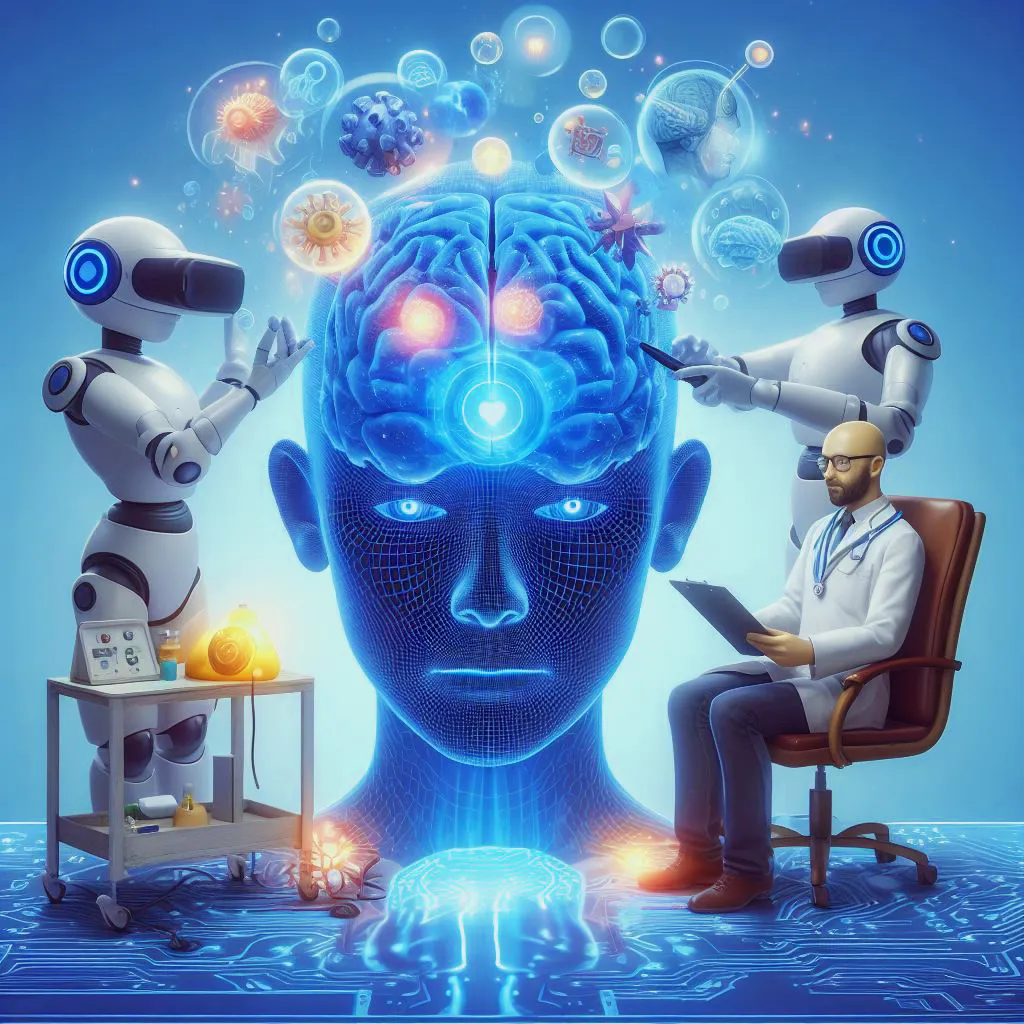Imagine entering a virtual reality therapy experience that allows you to develop coping skills and relax by engaging with lifelike holographic characters in virtual Reality (VR) therapy sessions. While this might sound futuristic, these therapies are actually becoming an increasingly important aspect of mental health care treatment.
Technology such as this also enables safe and controlled exposure therapy, helping therapists treat phobias, anxieties, and even posttraumatic stress disorder (PTSD).
Tech’s Influence on Therapy
No doubt about it: technology has become an essential element of therapy. From the virtual reality cave in which Stephane Bouchard conducts sessions with clients to smartphone apps that promote mental wellness and offer on-demand psychometric assessments, technology has become an integral component of therapy today. Used alongside traditional approaches, tech has proven successful at helping overcome some of the biggest barriers to mental health care treatment, such as access and scheduling issues.
An immersive VR app that offers cognitive behavioral therapy can help patients overcome anxiety and depression, while its immersive experience enables exposure therapy by forcing patients to face triggers they would normally avoid (source).
AI may also help fill the void between demand for mental health services and available professionals by using AI-powered tools that support therapists with data about clients’ emotional states; for instance, an unnoticeable wearable device that alerts counselors when heart rates have spiked is one such solution.
AI: Revolutionizing Mental Health
AI solutions are revolutionizing mental healthcare with accessibility, personalization, and de-stigmatization capabilities. Utilizing these tools enables individuals to seek assistance for their conditions regardless of location or social standing, helping overcome one of the world’s major obstacles: a shortage of trained professionals.
Virtual Reality (VR) can help to treat many conditions, from alcohol addiction and claustrophobia to teenage depression and anxiety. VR has been especially helpful for treating posttraumatic stress disorder (PTSD), allowing users to relive traumatic situations safely in a virtual reality experience.
AI-powered chatbots and platforms such as Woebot are providing people with immediate emotional support in a secure, confidential manner. In addition, these tools are helping individuals address shortages of qualified psychiatrists by offering access to care beyond traditional office hours – particularly pertinent considering over 100 million Americans reside in areas of health care professional shortage. It should be remembered, however, that AI should supplement rather than replace human psychologists and psychiatrists.

VR’s Therapeutic Potential
VR has quickly become an invaluable asset to mental health professionals for use in clinical assessment. This step in treatment helps therapists understand how their clients react in different scenarios.
VR enables therapists to alter the environment and level of stimulation for clients, adding or subtracting elements as necessary to make an experience more personalized for a specific client. VR can be especially helpful when treating anxiety disorders; for instance, those fearful of flying could experience virtual flight scenarios that include or exclude turbulence for treatment purposes.
VR can not only assist therapists in assessing client responses, but it can also be used as therapy itself. One platform known as BetterHelp offers HIPAA-compliant online therapy via a smartphone app – making it more accessible than traditional face-to-face therapy sessions. Other services like Talkspace and AppliedVR use VR therapy to bring therapy services to those who wouldn’t otherwise afford it; such services have many benefits for helping individuals cope with symptoms without feeling embarrassed to seek assistance.
Affordability and Accessibility Solutions
Virtual therapy sessions don’t require scheduling, travel, or missed work to use them; virtual therapies are convenient and more affordable compared to in-person counseling sessions, according to experts.
Virtual therapists like Woebot, Ellipsis, and Replika are making waves in mental health services. These virtual therapists utilize keyword triggers and natural language processing technology to listen, respond, and help users cope with emotional distress. Their popularity stems from their friendly interfaces that emphasize empathy.
However, VR integration into healthcare can be challenging. One major roadblock is reimbursement and high-profile failures such as Pear Therapeutic’s have caused many to question if digital therapeutics have sustainable business models. Still, there are positive indicators – for instance, AppliedVR’s immersive VR technology received a CMS code for pain management in 2021 under an existing benefit category, which indicates potential future adoption of virtual therapeutics.

Ethical Dilemmas in Tech Integration
When using technology for mental health, it’s essential to keep ethics in mind. These include issues surrounding privacy, security, data collection, and how algorithms are designed; other related considerations might include invasiveness, inequality, or disinformation.
An example would be using an advanced machine learning algorithm to detect patterns of behavior that indicate depression and suicidal tendencies in clients, which would prove invaluable for therapists but could raise ethical concerns. Therefore, it’s crucial that practitioners keep abreast of new technological advancements and use best practices when employing such solutions for mental health purposes.
VR and AI could revolutionize therapy. Their powerful therapeutic potential exemplifies how technology and empathy can collaborate to promote mental wellness, with global accessibility and proactive support available worldwide. However, as with anything, this technology still needs to be monitored to ensure its use is ethical. Programmers behind AI create their code with values in mind; what it tells users comes directly from its programming, which represents what values and beliefs the programmers hold onto when creating AI-powered technologies like VR/AI are at play here.
Real Cases: Tech in Action
VR and AI provide promising applications in mental healthcare; however, their effective use requires human supervision and consideration of key factors to achieve optimal results for patients.
Virtual therapists and chatbots are useful resources that provide accessible information and coping strategies to those seeking assistance, while high-powered AI platforms monitor and interpret data to detect patterns that indicate depression or suicidal tendencies.
These technologies expand providers’ therapeutic toolbox by providing access to various treatment protocols. Over time, platforms may even permit tailoring specific protocols according to individual patient needs.
Although VR-based exposure therapy has long been practiced clinically, its accessibility and scalability could make it more widely available. Up until now, users required a valid prescription from their physician to access digital therapeutic tools outside clinical settings; however, companies such as Limbix (in Palo Alto) and Psious (in Barcelona) are creating VR content specifically targeting alcohol addiction, claustrophobia, and teenage depression.

Future Challenges and Opportunities
Technology can play an essential role in meeting the increasing needs of mental health care. Virtual Reality has shown impressive effectiveness at treating PTSD and other conditions; however, its development remains in its infancy, creating many challenges to consider.
Scalability remains an issue: while VR headsets have become more affordable, their usage still does not compare with smartphones or tablets and thus limits access to this service. Another obstacle involves training mental health professionals on how to utilize this technology effectively.
AI systems run the risk of being Biased If their systems rely on data that has not been thoroughly vetted. This can lead to inaccurate predictions and perpetuate social prejudices; engineers and mental health professionals must work together in order to ensure no such biases enter the system.
However, mental health VR holds some promising prospects for its future development. Some companies have created gaming systems that combine entertainment with rapid treatment protocols for conditions such as alcohol addiction, claustrophobia, and teenage depression.
Conclusion
Virtual reality therapy offers an innovative and immersive therapeutic experience that can help patients tackle psychological distress in a safe environment, making this form of exposure therapy especially effective for anxiety sufferers.
Virtual Reality (VR) can also be used to deliver cognitive behavioral therapy, which aims to identify and alter negative thought patterns. It has proven particularly effective for treating anxiety disorders when combined with other treatment approaches such as psychotherapy or medication.
As more people turn to apps and digital platforms for mental health services instead of traditional in-person services, many rely on them for their care. This trend may persist even once social distancing measures have been lifted. While such platforms provide convenient access, they may not provide as effective help as meeting with an actual therapist directly.
AI offers incredible potential in mental health. Through personalized interventions, global accessibility, and proactive support services such as AI for prevention services – as well as personalized interventions tailored to each person – AI will lead to a future where technology meets empathy seamlessly. However, regulations must ensure transparency and ethics standards are upheld to achieve its fullest potential in mental health.


